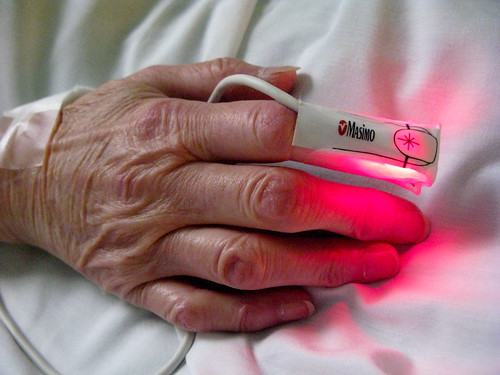Breaking Through
 This past summer, I spent two weeks sitting, working and, once, sleeping next to a hospital bed, trying and failing to communicate with my father.He had called for an ambulance on the evening of July 25 because he couldn’t breathe. With end-stage emphysema, he often couldn’t breathe, but apparently that night he was frightened enough to call for help. At the hospital, the doctors intubated him and doused him with the sedatives one needs to withstand a hard plastic tube down the throat. My sister and I never knew if he had agreed to the intubation, or if he was too weak or panicked to voice a clear opinion. Over the next few days in the ICU, although still heavily sedated, he sometimes acted in ways that seemed deliberate: he would open his eyes wide, or furrow his brow, or nod to a question or squeeze my hand. But I was never really sure. I wasn’t sure if he would have wanted us to agree to the tracheostomy procedure, on August 2, or remove the ventilator, on August 9.What if I could have been more sure?I couldn’t help but think about that a couple of weeks ago while having coffee with Jon Bardin at the Society for Neuroscience meeting in Washington, D.C. A few years back, Jon left the science magazine where we both worked to pursue a PhD in neuroscience. He joined the lab of Nicholas Schiff, an expert on the neural basis of consciousness, and began studying the brain activity of people with severe brain injury. And now at the conference, Jon told me, he would be presenting a poster of unpublished data suggesting that brain waves can reveal whether a somewhat conscious person is tuning in when other people speak.Read more at...The Last Word on Nothing, November 2011.
This past summer, I spent two weeks sitting, working and, once, sleeping next to a hospital bed, trying and failing to communicate with my father.He had called for an ambulance on the evening of July 25 because he couldn’t breathe. With end-stage emphysema, he often couldn’t breathe, but apparently that night he was frightened enough to call for help. At the hospital, the doctors intubated him and doused him with the sedatives one needs to withstand a hard plastic tube down the throat. My sister and I never knew if he had agreed to the intubation, or if he was too weak or panicked to voice a clear opinion. Over the next few days in the ICU, although still heavily sedated, he sometimes acted in ways that seemed deliberate: he would open his eyes wide, or furrow his brow, or nod to a question or squeeze my hand. But I was never really sure. I wasn’t sure if he would have wanted us to agree to the tracheostomy procedure, on August 2, or remove the ventilator, on August 9.What if I could have been more sure?I couldn’t help but think about that a couple of weeks ago while having coffee with Jon Bardin at the Society for Neuroscience meeting in Washington, D.C. A few years back, Jon left the science magazine where we both worked to pursue a PhD in neuroscience. He joined the lab of Nicholas Schiff, an expert on the neural basis of consciousness, and began studying the brain activity of people with severe brain injury. And now at the conference, Jon told me, he would be presenting a poster of unpublished data suggesting that brain waves can reveal whether a somewhat conscious person is tuning in when other people speak.Read more at...The Last Word on Nothing, November 2011.